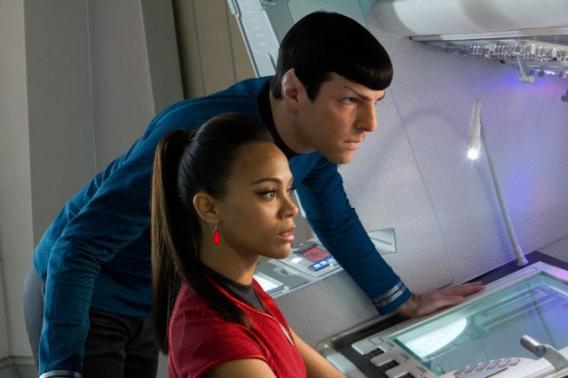At the end of Star Trek: Into Darkness the U.S.S. Enterprise is prepared to jet off into the literal darkness of deep space. But thematically it’s a move out of darkness and into the rosy utopianism that is the hallmark of the Trek franchise. After a film full of violence, betrayals, and internal conspiracies, Captain James Kirk is prepared to leads its crew on a five-year mission to seek out new life and new civilizations, to boldly go where no one has gone before. It’s a great finish to a film that was surprisingly successful at delivering a mainstream pop cinema experience while simultaneously doing a much better job than the previous J.J. Abrams movie of hewing to the true Trek faith.
In the rankings, I’d put it just above Abrams’ first Trek offering. That’s above average for the films, and it’s always a good thing when a sequel beats its predecessor. But I do have reservations about the film. Spoilers follow.
The problem with essentially remaking The Wrath of Khan is that you’re asking yourself to be judged against the standard of the consensus best Trek movie. Taking the series in this direction somewhat changes our understanding of the timeline reset. In the previous film, it freed Abrams from the burden of continuity. With Darkness, it works more like a comic book continuity reboot, in which the same stories—Batman’s struggle with the Joker, the beginning of Superman’s feud with Lex Luthor—are told over and over. Characters are transformed into archetypes who can be interpreted and reinterpreted again and again.
And as a reinterpretation of the Khan arc, Darkness adds little beyond CGI—and it subtracts a great deal. The Wrath of Khan is a story about a relatively old Kirk, facing up to a former lover, a son with whom he has no relationship, and the lingering legacy of his previous encounter with Khan. Khan himself is committing bad acts, but his quest for vengeance is something we can understand—even sympathize with. The explicit allusion to Moby Dick, with Khan as a 23rd-century Ahab, is both appropriate and earned.
Darkness’s allusions, by contrast, are simply to the original Khan film. And while they’re pleasant Easter eggs for Trekkers, at times they compromise the story. Spock’s invocation of the principle that “the needs of the many outweigh the needs of the few” isn’t especially relevant to the crisis at hand. Abrams’ version of Dr. Carol Marcus has no relationship with the other characters and little role in the story beyond creating a thin pretext to show a pretty woman in her underwear.
What the film gets right, fundamentally, simply underscores the extent to which Trek belongs on television. The entire theme of the film is that Starfleet should not be a military organization and the Enterprise shouldn’t be engaged in shoot ’em ups. But Abrams’ key contribution to the franchise has been to turn out well-paced action/adventure flicks full of shoot ‘em ups and spaceship chases. If the best this mode of filmmaking can deliver is inferior remakes of the best Trek movies, then why not leave it alone?
A movie about the peaceful five-year mission of exploration that Kirk is about to embark on would be dull. Derailing it in favor of yet another militaristic adventure would be untrue to the spirit of the franchise. But why not a television show about deep space exploration? It’s worked before. And it’s clear that the technology now exists to make it look much better than ever before.
